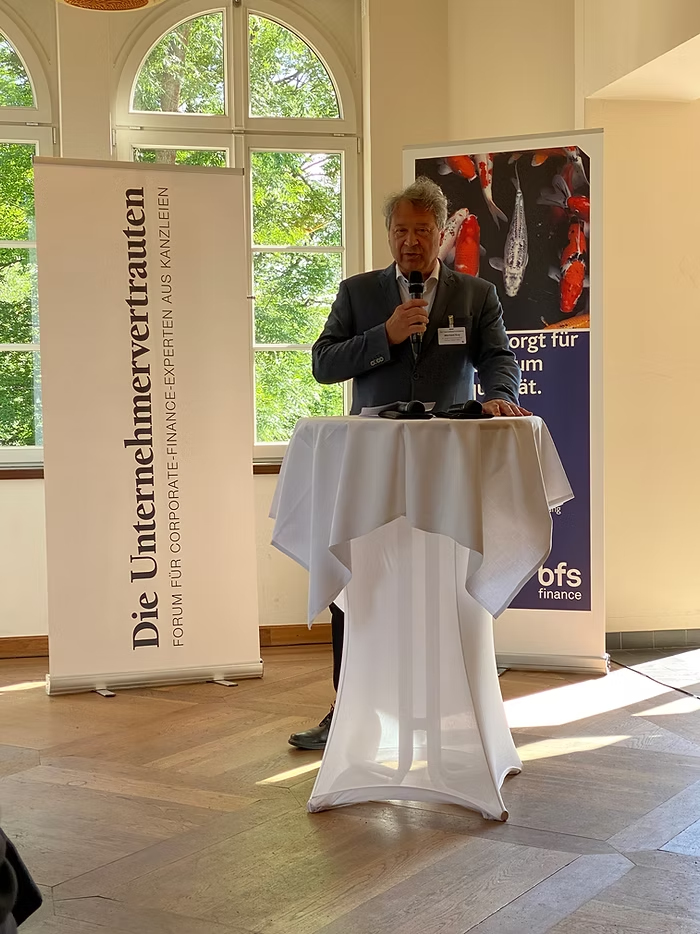Challenges of business succession

Introduction
Business succession is an exciting and complex project in which every purchase and sale is unique. Even experienced buyers who have already acquired over 100 companies in the same industry emphasize that each transaction must be tailored individually.
In M&A business, the focus is on valuation and legally correct and structural transfer in the context of corporate succession. However, during the discussion rounds of the “Unternehmensvertrauten” (company confidants) on May 28 in Leipzig, it became clear how crucial and yet often neglected the human factor is. Our Quantensprung team member Michael Koy spoke about this in a conversation with Bastian Frien, among others.
 A brief summary of the key points provides an overview of the challenges involved in selling a business:
A brief summary of the key points provides an overview of the challenges involved in selling a business:
Preparing for a sale is often comparable to mentally preparing for a farewell. That is why it is ideal for a tax advisor to begin providing advice on business succession two years before the planned handover date or from the age of 55 onwards.
Parallel to the mental process of coming to terms with the change, the company can be optimized for sale and the psychological impact on employees can be prepared for. The emergence of uncertainty and feelings of insecurity should be avoided at all costs. Critical knowledge should be recorded and the documentation basis for the sales process should be initiated at an early stage.
A high degree of digitalization thus increases value in several ways. On the one hand, it ensures the collection and processing of valuable data, transparency in business processes, and clarification of roles and responsibilities.
A company that has grown over many years often has peculiarities and excesses that are not always advantageous in the event of a sale. It is therefore necessary to thoroughly review the company to determine whether it can be sold in its current form in a meaningful and valuable way. This includes analyzing the market, potential buyers, and whether the company as a whole or only parts of it are of interest.
It is important to know what the market pays for similar companies and what buyers' expectations are. The financial viability of the purchase plays a central role – full repayment should be possible within seven to eight years. The company must meet the banks' benchmarks, as unique companies are often difficult to finance.
The willingness of the co-shareholders to sell and their position on continuing to work in the company must be clarified. A smooth handover often requires a transition phase during which the old owner is available as a consultant. However, this phase should not usually last longer than three months, but can be extended if necessary.
Employees are usually a company's most valuable asset. Unfortunately, their transfer is often underestimated. Thorough preparation of employees for the takeover is essential. This includes documenting know-how, knowledge management, and clear distribution of responsibilities within the company. Measures to prevent an outflow of talent should also be implemented, as employee expectations are higher today than they were ten years ago.
All contracts and agreements within the company must be transparent and structured. A data room in which all relevant documents are stored is essential. The annual financial statements should be complete and clearly comprehensible to ensure a smooth due diligence review.
A buyer wants to find a well-prepared company. Delays and ambiguities can reduce the buyer's interest or even lead to the negotiations being broken off. In addition, a company that is up for sale quickly becomes a target for competitors and headhunters. Fast and efficient processing is therefore crucial to preserve the value of the company and the cohesion of the workforce.

Business succession therefore requires careful and comprehensive preparation. A tax advisor plays a central role in this process and must take into account not only tax issues but also strategic and organizational aspects in order to ensure the process is successful. With careful planning and the right attitude, business succession can be a successful project for both the seller and the buyer.
A management consultancy such as Quantensprung provides support in preparing the company for sale, marketing, negotiation, and, above all, integration tasks. With our focus on the human factor in change, we help to maximize the value of the company for both seller and buyer, minimize risks, and ensure a smooth and successful sales process for all involved.
Seminar Fees And Terms
-
The seminar fee excludes 19% VAT.
-
Drinks and lunch are included.
-
Minimum 8 participants required.
By booking, you agree to our Terms & Conditions and Privacy Policy. You may cancel within 14 days without providing a reason.

Register for the Event
Fill in your details below to secure your seat.
Thank you for your registration!
We have received your register and will send you a confirmation email shortly.
If any additional information is needed, we will contact you via email. Please keep an eye on your inbox.
